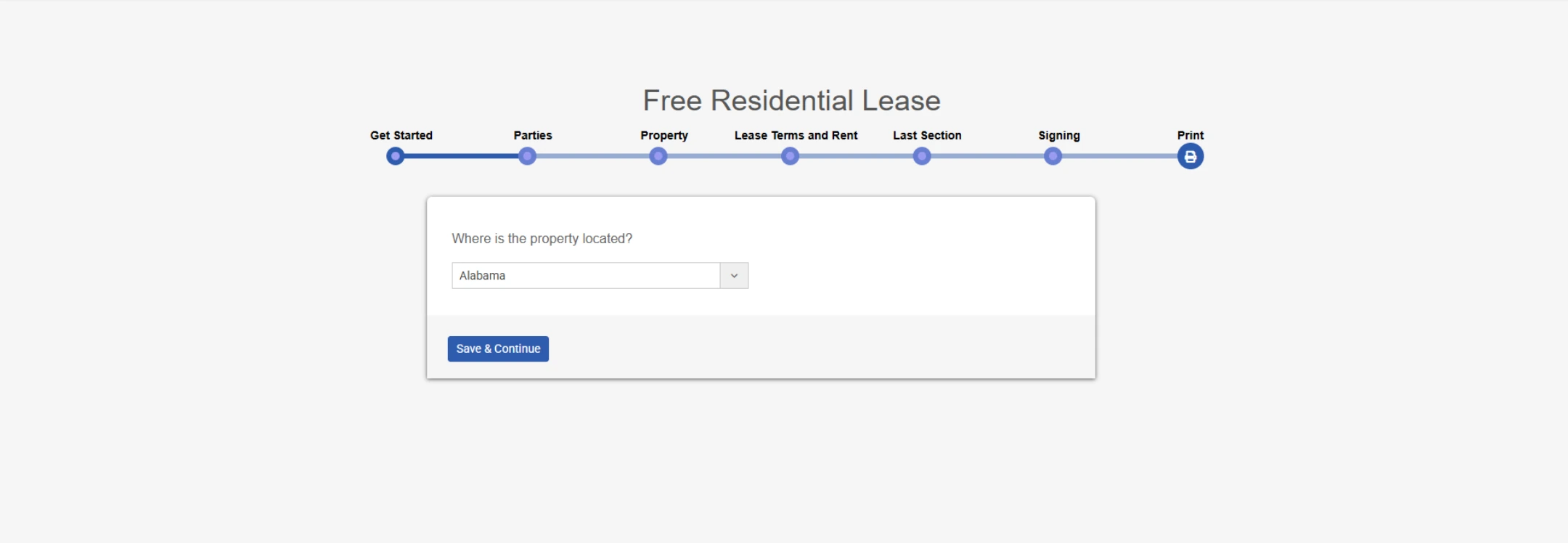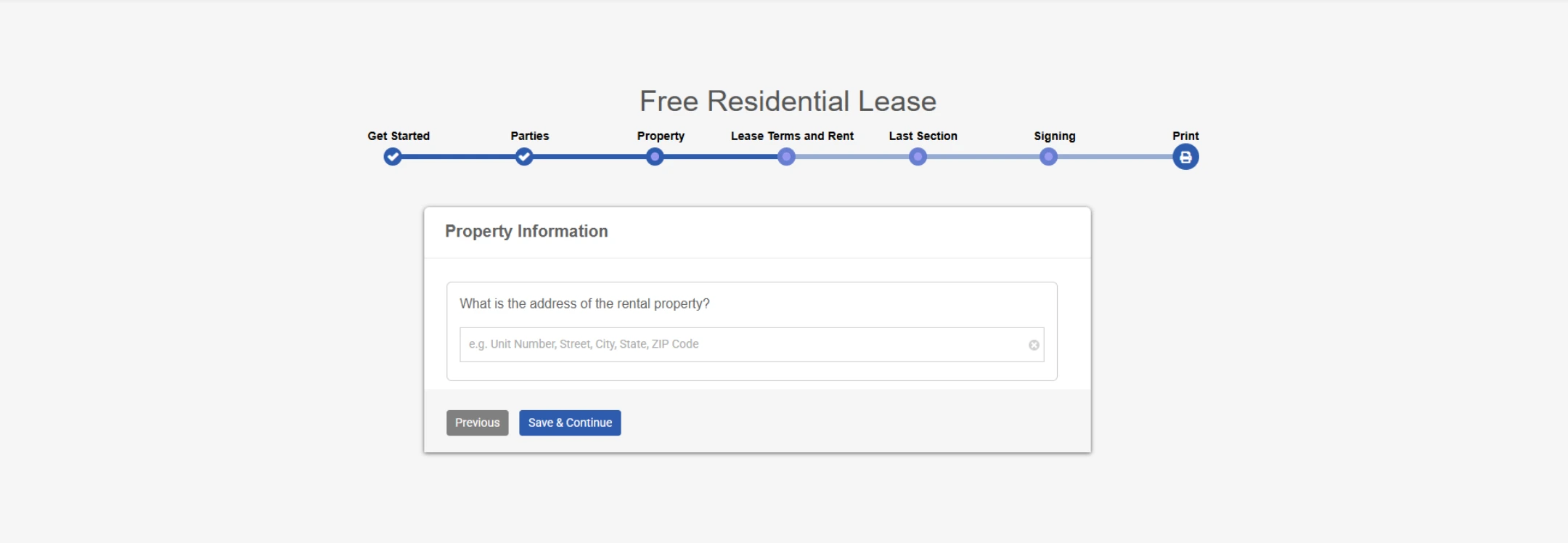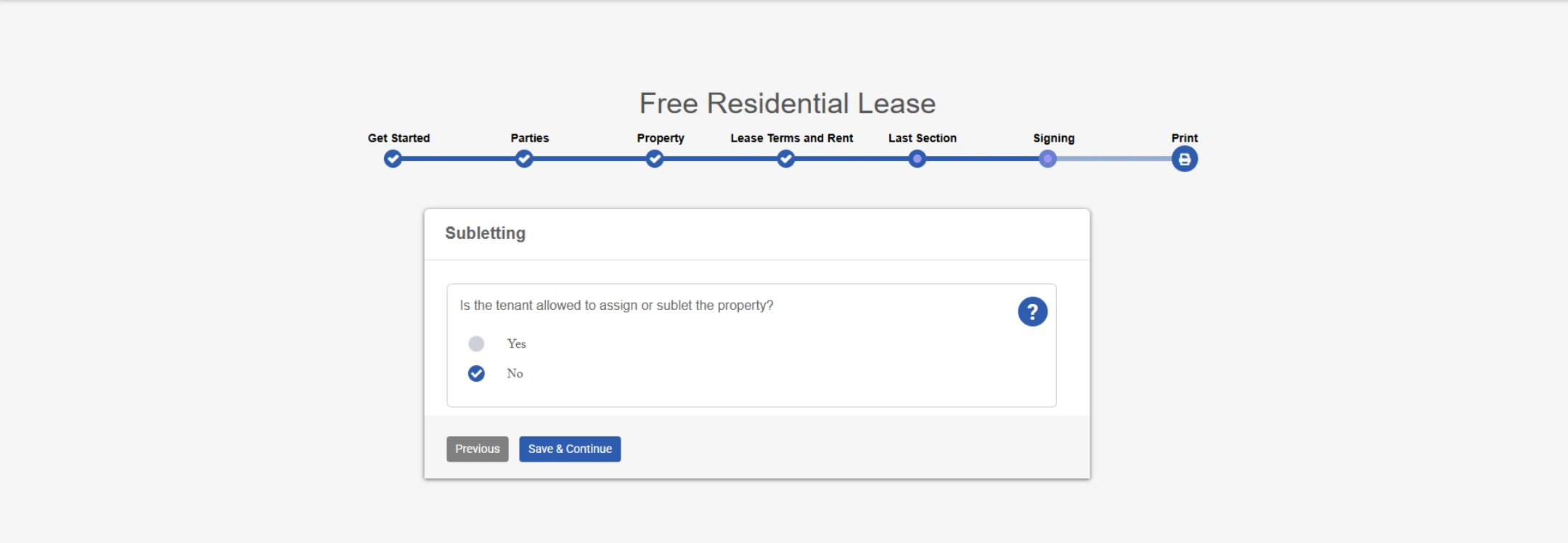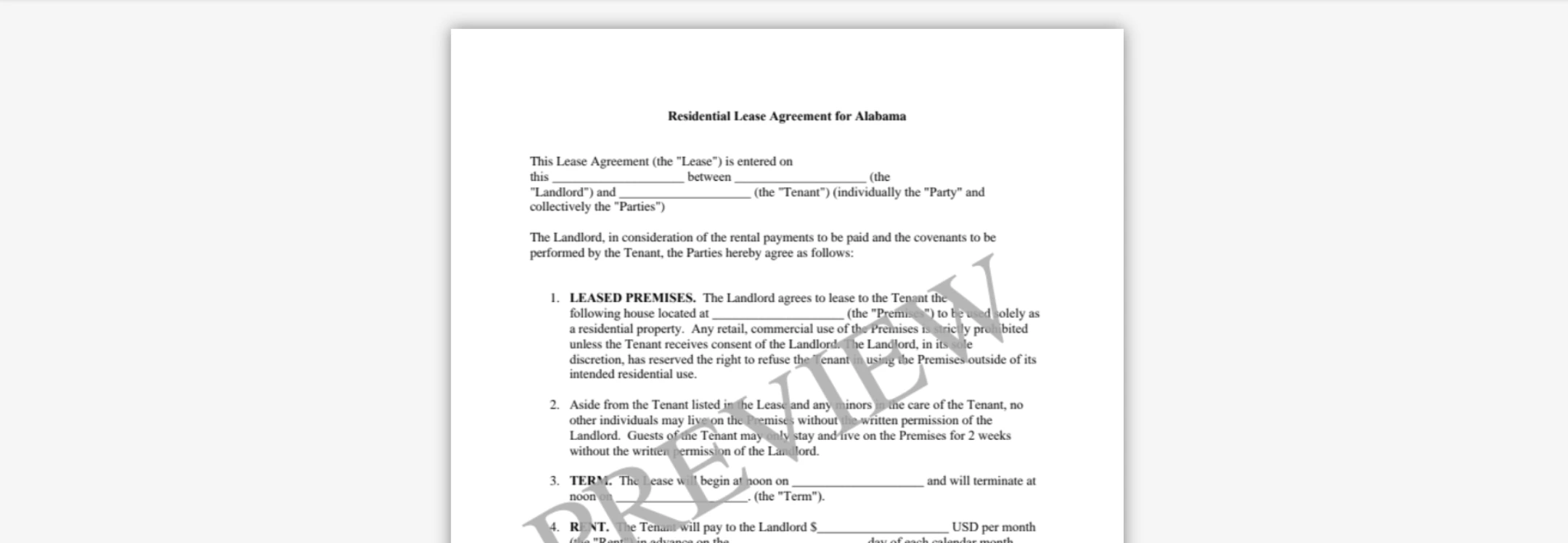Last Updated: January 17, 2026
TL;DR
- Online platforms streamline creating residential lease agreements by providing state-specific templates and automated compliance features
- Digital tools reduce errors, save time, and eliminate the need for in-person meetings or physical paperwork
- Residential lease agreement templates from online platforms include essential clauses and legal protections required by federal and local laws
- Electronic signatures make lease execution faster and more secure while maintaining full legal validity
- Benefits include cost savings, better document organization, easier renewals, and improved landlord-tenant communication
- You can use Ziji Legal Forms' Residential Lease Agreement Templates to create legally valid documents.
Introduction: Why Lease Agreements Are Essential
Creating a proper residential lease agreement represents one of the most critical steps in establishing a successful landlord-tenant relationship. This legal document serves as the foundation that protects both parties' interests while clearly defining rights, responsibilities, and expectations throughout the tenancy period.
The importance of having a written residential lease agreement form cannot be overstated. Federal and state laws recognize these agreements as legally binding contracts that establish the framework for rental relationships. Without proper documentation, both landlords and tenants face significant risks that can lead to costly disputes, legal complications, and financial losses.
Verbal agreements and outdated paper contracts create dangerous vulnerabilities in today's rental market.
Verbal arrangements, while sometimes legally valid, provide no clear evidence of agreed-upon terms when disputes arise. Memory fades, circumstances change, and what seemed like clear understanding between parties often becomes contentious disagreement months later.
Similarly, outdated residential lease forms that haven't been updated for current laws can expose landlords to liability issues while leaving tenants without proper protections. Housing regulations evolve constantly, with new disclosure requirements, safety standards, and tenant rights emerging regularly. Using obsolete documents essentially guarantees compliance failures that regulatory agencies actively pursue.
The digital revolution has transformed how property professionals approach lease creation and management. Modern online platforms provide residential lease agreement templates that automatically incorporate current legal requirements while streamlining the entire process from creation to execution. These tools eliminate the guesswork involved in crafting compliant agreements while reducing the time and cost associated with traditional methods.
Legal Risks of Generic Online Lease Agreements
Not all online residential lease agreements are created with local legal requirements in mind. Many generic platforms use one size fits all templates that may miss state specific disclosures, notice periods, or tenant protection rules. For example, landlord obligations around security deposits, habitability, and entry rights vary significantly across U.S. states. Using a lease that does not reflect local laws can expose landlords to disputes, penalties, or unenforceable clauses.
Tenants may also face uncertainty if key terms like maintenance responsibility or early termination rights are unclear. Reviewing whether an online lease aligns with state and county regulations is critical before signing. A legally sound lease should balance convenience with compliance, ensuring that both parties are protected from avoidable legal risks.
Benefits of Using Online Platforms for Lease Agreements
Online platforms have revolutionized the residential lease agreement creation process by addressing the most common challenges landlords and property managers face when preparing rental documentation. These digital solutions transform what was once a complex, error-prone process into a streamlined, professional experience.
Accuracy and Completeness
Template precision represents perhaps the greatest advantage of using online platforms for creating residential lease agreement forms. Professional platforms employ legal experts who continuously update templates to reflect current federal, state, and local requirements. This automated compliance checking eliminates the risk of missing critical clauses that could invalidate the agreement or expose parties to liability.
Traditional lease creation often involves copying from previous agreements or trying to adapt generic forms found online. This approach frequently results in missing essential elements such as required disclosures, proper termination procedures, or current fair housing language. Online platforms systematically include all necessary components while allowing customization for specific property needs.
Error reduction occurs naturally when using structured templates that guide users through each section. Interactive questionnaires ensure no critical information gets overlooked, while built-in validation checks flag incomplete or inconsistent entries before document finalization. This systematic approach dramatically reduces the revision cycles that commonly plague manual lease preparation.
Time and Cost Efficiency
Rapid document creation through online platforms typically reduces lease preparation time from hours to minutes. Instead of starting from blank documents or searching through files for previous agreements, users can generate professional residential lease agreements by simply completing guided forms. The platform handles formatting, legal language, and clause organization automatically.
Elimination of printing and meeting costs provides immediate financial benefits. Traditional lease signing requires multiple printed copies, coordination of in-person meetings, and often travel expenses for parties to gather for execution. Online platforms enable complete lease creation and signing without any physical materials or face-to-face meetings.
Reduced legal consultation needs for standard residential leases represent significant cost savings. While complex arrangements may still benefit from attorney review, most routine residential rental agreements can be created with confidence using professionally designed templates. This allows property owners to reserve legal expenses for truly complex situations rather than routine documentation.
Enhanced Organization and Accessibility
Digital storage and retrieval capabilities transform lease management from a filing cabinet nightmare into an organized, searchable system. Online platforms automatically store executed agreements in secure cloud environments where authorized parties can access them instantly from any location. This accessibility proves invaluable during emergencies, disputes, or routine tenant communications.
Version control and tracking features ensure all parties always work with the most current agreement version. When lease amendments or renewals occur, the platform maintains complete history while clearly identifying the active terms. This prevents confusion that commonly arises when multiple document versions exist in different locations.
Integration with property management tools creates seamless workflows that extend beyond lease creation. Many platforms connect lease information directly to rent collection systems, maintenance request platforms, and tenant communication tools. This integration eliminates duplicate data entry while ensuring consistency across all property management functions.

Key Features of Online Lease Agreement Platforms
Modern online platforms provide comprehensive tools that address every aspect of residential lease agreement creation and management. Understanding these features helps property owners select platforms that best serve their specific needs while maximizing the benefits of digital lease management.
Template Customization and Compliance
State-specific templates ensure residential lease agreement templates comply with local laws without requiring users to research complex regulatory requirements. Each jurisdiction has unique disclosure requirements, termination procedures, and tenant protection provisions that must be properly addressed. Professional platforms maintain current templates for all states while automatically incorporating federal requirements.
Customizable clauses allow property owners to address unique situations while maintaining legal compliance. Whether specifying pet policies, parking arrangements, or maintenance responsibilities, platforms provide flexible options that can be tailored to individual property needs. This customization capability eliminates the need for separate addendums or manual modifications that might compromise legal effectiveness.
Automatic updates keep templates current as laws change. Rather than requiring users to monitor regulatory changes and update their forms manually, professional platforms track legal developments and automatically incorporate necessary modifications. This ensures ongoing compliance without additional effort from property owners.
Electronic Signature and Execution
Digital/Electronic signature capabilities enable complete lease execution without physical meetings or paper documents. Electronic signatures carry the same legal weight as handwritten signatures under federal law while providing additional security features that traditional signatures cannot match. Digital execution also creates detailed audit trails that document exactly when and how each party signed the agreement.
Multi-party coordination features streamline situations involving multiple tenants, co-signers, or property management companies. The platform manages the signing sequence, sends automatic reminders to pending signers, and provides real-time status updates to all parties. This coordination eliminates the confusion and delays that commonly occur with traditional signing processes.
Mobile accessibility allows lease execution from smartphones and tablets, providing ultimate flexibility for busy schedules. Tenants can review and sign residential lease forms during lunch breaks, while traveling, or from any location with internet access. This convenience factor often accelerates the leasing timeline significantly.
Document Management and Organization
Centralized storage keeps all lease-related documents in one secure location accessible to authorized parties. Beyond the primary residential lease agreement, platforms typically store applications, screening reports, inspection records, and correspondence in organized folders linked to specific properties and tenants.
Search and filtering capabilities enable quick location of specific information across large portfolios. Property managers can instantly find all leases expiring within specific timeframes, identify agreements with particular clauses, or generate reports based on various criteria. This functionality becomes invaluable as property portfolios grow.
Backup and security features protect important documents from loss while maintaining privacy and compliance with data protection regulations. Professional platforms employ enterprise-grade security measures including encryption, access controls, and redundant storage systems that exceed what individual property owners could implement independently.
Common Mistakes Online Platforms Help Avoid
Traditional residential lease agreement creation involves numerous pitfalls that can compromise legal protection, create tenant disputes, or result in regulatory violations. Online platforms systematically address these common errors through automated guidance and built-in compliance features.
Missing or Inadequate Terms
Incomplete rent and fee specifications frequently occur when landlords try to modify existing agreements or use generic forms. Online platforms ensure all financial terms are clearly defined, including base rent, additional fees, late payment penalties, and security deposit details. Interactive prompts guide users through every financial aspect while ensuring proper legal language.
Omitted required disclosures represent serious compliance violations that can invalidate leases or trigger regulatory penalties. Federal lead paint disclosures, state-specific rental regulations, and local ordinance requirements vary significantly by location. Professional platforms automatically include all applicable disclosures based on property location and characteristics.
Unclear termination procedures create major problems when leases end or need early termination. Many handwritten or copied agreements fail to specify proper notice requirements, procedures for lease violations, or security deposit return processes. Online templates include comprehensive termination language that protects both parties while ensuring legal compliance.
Formatting and Legal Language Issues
Inconsistent formatting makes agreements difficult to read and can create ambiguity about important terms. Professional online platforms maintain consistent formatting standards throughout the document while using clear, legally precise language that both parties can understand easily. Outdated legal references commonly appear in agreements copied from older documents or generic forms. Laws change regularly, and references to superseded statutes or regulations can create legal vulnerabilities. Automated platforms maintain current legal references while ensuring all cited authorities remain valid.
Ambiguous provisions that seemed clear during creation often become sources of dispute later. Online platforms use standardized language that has been tested in various situations while providing clear definitions for terms that might be misinterpreted.
Administrative and Procedural Errors
Forgetting to update terms like rent increases, late fees, or renewal options represents a common oversight that can have significant financial implications. Once a lease is on an online platform users can review and update all financial terms while maintaining historical records of previous agreements for reference.
Inadequate tenant information collection can create problems with rent collection, emergency contacts, or legal proceedings if necessary. Professional platforms ensure comprehensive tenant data collection while maintaining proper organization and accessibility.
Poor record keeping often results in lost documents, version confusion, or inability to locate important information when needed. Digital platforms automatically organize and store all lease-related documents while providing search capabilities that make information retrieval instant and reliable.
Making a Residential Lease Agreement with Ziji Legal Forms
Here's how Ziji Legal Forms Residential Lease Template simplifies the lease creation process.
1. Choose your state to generate a compliant residential lease form.

2. Answer some guided questions about your property, rent amount, and terms.

3. Customize additional clauses relevant to your use case (utilities, pets, smoking, storage and subletting, etc.).

4. Download and review the lease document.

Visit Ziji Legal Forms' Residential Lease Agreement Template and create your document today.
How Ziji Legal Forms Supports Legally Compliant Lease Creation
When creating a residential lease agreement online, accuracy and legal relevance matter as much as speed. Ziji Legal Forms is designed to help users create residential lease agreements that reflect U.S. legal expectations rather than generic assumptions. Instead of static templates, the platform focuses on structured clauses that cover essential lease terms such as rent, duration, security deposits, termination conditions, and landlord tenant responsibilities. This approach helps reduce ambiguity and improves clarity for both parties.
By using a purpose built legal platform, landlords and tenants can create lease agreements that are easier to understand, more consistent, and better aligned with legal standards. This makes online lease creation more reliable and practical for real world residential rentals.
Cost Analysis: Online Platforms vs. Traditional Methods
Understanding the financial implications of different residential lease agreement creation methods helps property owners make informed decisions about their documentation processes. The cost comparison extends beyond immediate expenses to include time savings, error reduction, and long-term operational benefits.
Direct Cost Comparisons
Platform subscription fees for online lease creation services typically range from free basic versions to premium plans costing $30-$50 for one time use. Annual plans are also available where you can create unlimited documents for about $10 to $20 per month. These costs should be evaluated against the number of leases created annually and the time savings achieved. Most property owners find that platforms pay for themselves after creating just a few agreements.
Traditional legal fees for attorney-prepared lease agreements often exceed $300-500 per document, making this approach prohibitively expensive for most residential rental situations. While legal review remains valuable for complex arrangements, standard residential rental agreements rarely justify this expense when quality online tools are available.
Printing and administrative costs accumulate quickly with traditional paper-based processes. Multiple copies, overnight delivery, notarization fees, and storage expenses add significant costs to each lease transaction. Online platforms eliminate virtually all these expenses while providing superior organization and accessibility.
Time and Efficiency Savings
Document preparation time drops dramatically when using online platforms. Traditional lease creation often requires several hours of research, drafting, and formatting work. Online platforms reduce this to 15-30 minutes of guided input while producing professional results that match or exceed manually prepared documents.
Revision and correction cycles decrease substantially with template-based creation. Online platforms' built-in error checking and compliance features eliminate most common mistakes that require document revisions. This reduces both preparation time and the frustration associated with multiple correction cycles.
Coordination and execution time savings from electronic signatures often represent the most significant efficiency gain. Traditional lease signing requires coordinating schedules, arranging meetings, and managing paperwork exchange. Digital execution eliminates these logistics while providing immediate completion confirmation.
Long-term Value Considerations
Scalability benefits become apparent as property portfolios grow. Online platforms handle increased volume without proportional increases in time or cost, while traditional methods become increasingly burdensome. Property owners can manage dozens of leases as easily as one using digital tools.
Compliance maintenance through automated updates provides ongoing value that's difficult to quantify but extremely important. Staying current with changing regulations requires continuous monitoring and document updates that online platforms handle automatically. This ongoing compliance support prevents costly mistakes and regulatory violations.
Professional presentation advantages from using quality online platforms often translate into faster lease-up times and higher tenant satisfaction. Professional-looking agreements create positive first impressions while clearly communicating expectations that reduce future disputes and tenant turnover.
Future of Digital Lease Management
The evolution of online residential lease agreement platforms continues advancing rapidly, with emerging technologies promising even greater efficiency and capabilities for property owners and tenants alike. Understanding these trends helps inform current platform selection while preparing for future opportunities.
Emerging Technologies
Artificial intelligence integration is beginning to enhance online platforms' capabilities through automated clause recommendations, risk assessment, and customization suggestions based on property characteristics and local market conditions. These features promise to make lease creation even more efficient while improving agreement quality.
Blockchain technology may eventually provide enhanced security and verification capabilities for residential lease agreements. While still emerging, blockchain-based systems could offer immutable record keeping and simplified verification processes that further streamline lease management.
Mobile-first design reflects the increasing preference for conducting business through smartphones and tablets. Current platforms can provide comprehensive mobile capabilities, allowing complete lease management from portable devices without compromising functionality.
Industry Integration Trends
Property management ecosystem connectivity continues expanding as online lease platforms integrate more deeply with other property management tools. Future systems will likely provide seamless data flow between lease creation, rent collection, maintenance management, and financial reporting systems.
Tenant experience enhancement through better digital interfaces and communication tools will likely become a key differentiator among platforms. Features like tenant portals, automated notifications, and self-service capabilities will probably become standard offerings that improve satisfaction while reducing management workload.
Regulatory compliance automation will likely become more sophisticated as platforms incorporate machine learning capabilities that can adapt to changing laws and regulations automatically. This evolution will further reduce the compliance burden on property owners while ensuring continued legal protection.
Conclusion
Online platforms have fundamentally transformed residential lease agreement creation by combining legal expertise, technological efficiency, and user-friendly interfaces into comprehensive solutions that benefit both landlords and tenants. These digital tools eliminate the complexity, errors, and inefficiencies associated with traditional lease preparation while ensuring compliance with current legal requirements.
The benefits of using online platforms extend far beyond simple convenience. Professional residential lease agreement templates provide legal protection that matches or exceeds attorney-prepared documents while reducing costs and preparation time dramatically. Electronic signature capabilities enable rapid lease execution without geographic constraints, while digital storage provides superior organization and accessibility compared to paper-based systems.
Property owners who embrace these digital solutions position themselves advantageously in competitive rental markets where efficiency and professionalism matter increasingly. The time savings, cost reductions, and improved compliance these platforms provide allow property owners to focus on core business activities rather than administrative paperwork. As these platforms continue evolving with new features and capabilities, early adopters will benefit from ongoing improvements while building expertise with tools that are becoming industry standards.
Residential Lease FAQs
What is a residential lease agreement also called?
It's also known as a rental agreement, rental contract, or tenancy agreement, all refer to the same legal document used to rent residential property.
Why should landlords use a written lease?
A written lease clearly outlines each party’s rights and responsibilities, minimizes disputes, and holds up in court better than a verbal agreement.
Can landlords enter the property anytime?
No. Landlords must give prior written notice (typically 24 hours) before entering the rental unit, unless there's an emergency.
What are a landlord’s basic responsibilities?
Landlords must ensure the property meets health and safety standards, perform necessary repairs, and respect the tenant’s right to quiet enjoyment.
Can tenants have guests or roommates?
Tenants may have overnight guests, but long-term occupants typically must be listed on the lease. Unauthorized long-term guests may violate the agreement.
What’s the difference between fixed-term and month-to-month leases?
Fixed-term leases have set start and end dates for a set period of time, offering more income predictability for the landlord. Month-to-month leases renew every month until the landlord or tenant provides notice to end the lease. It offer more flexibility to adjust rent or termination but less stability in income.
Are tenants allowed to sublet or assign the lease?
Only if permitted in the lease. Subletting allows tenants to rent to someone else temporarily; assigning transfers the lease completely to another person.
What laws govern the lease?
The lease is governed by the laws of the state where the property is located, not where the landlord or tenant resides.
Can I write my own lease without a lawyer?
Yes. Tools like Ziji Legal Forms let you create a customized, legally valid residential lease in minutes by answering a simple questionnaire.
What jurisdictions can use our residential lease?
You can use our template to create a legal and valid residential lease for the following jurisdictions:
| Alabama (AL) | Alaska (AK) | Arizona (AZ) | Arkansas (AR) | California (CA) |
| Colorado (CO) | Connecticut (CT) | Delaware (DE) | District of Columbia (DC) | Florida (FL) |
| Georgia (GA) | Hawaii (HI) | Idaho (ID) | Illinois (IL) | Indiana (IN) |
| Iowa (IA) | Kansas (KS) | Kentucky (KY) | Louisiana (LA) | Maine (ME) |
| Maryland (MD) | Massachusetts (MA) | Michigan (MI) | Minnesota (MN) | Mississippi (MS) |
| Missouri (MO) | Montana (MT) | Nebraska (NE) | Nevada (NV) | New Hampshire (NH) |
| New Jersey (NJ) | New Mexico (NM) | New York (NY) | North Carolina (NC) | North Dakota (ND) |
| Ohio (OH) | Oklahoma (OK) | Oregon (OR) | Pennsylvania (PA) | Rhode Island (RI) |
| South Carolina (SC) | South Dakota (SD) | Tennessee (TN) | Texas (TX) | Utah (UT) |
| Vermont (VT) | Virginia (VA) | Washington (WA) | West Virginia (WV) | Wisconsin (WI) |
| Wyoming (WY) |
GET STARTED FOR FREE
Create your
Get Started For Free

